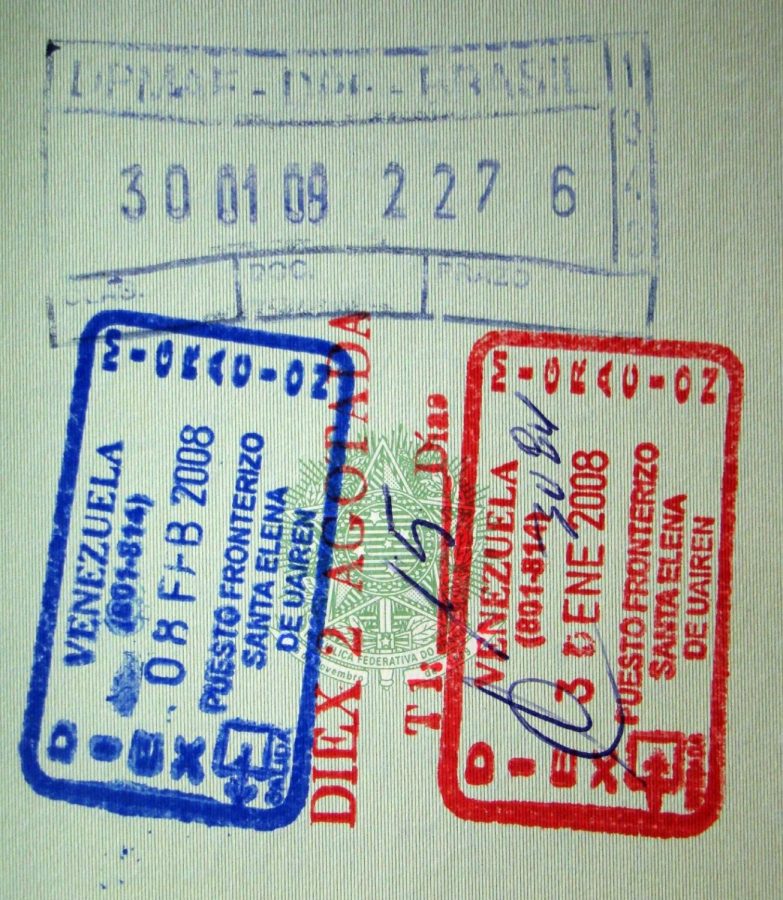Policy offers protection to three hundred thousand Venezuelan immigrants
Sem Paradeiro, licensed under CC BY-NC-SA 2.0
A Brazilian passport with Venezuelan stamps.
Of the 5.4 million Venezuelan refugees and migrants around the world, an estimated 320,000 of them living in the United States are now eligible for deportation protection and work permits thanks to a decree made by the Biden administration on March 8, 2021. The Biden administration cited the political and economic struggles of Venezuela, which leaves deported citizens without a guarantee of safe return.
CBS News reported that Venezuelan immigrants living in the United States as of March 8 are eligible for Temporary Protected Status (TPS), for which they have 180 days to apply. According to the American Immigration Council, TPS was created in the Immigration Act of 1990 and is used to provide aid to migrants of countries undergoing an ongoing armed conflict, an environmental disaster, an epidemic of “extraordinary and temporary conditions” that hinder the country’s ability to provide for any returning citizens.
The council also reported that Venezuela joins 10 other countries currently under TPS in the United States: El Salvador, Haiti, Honduras, Nepal, Nicaragua, Somalia, South Sudan, Sudan, Syria, and Yemen.
In addition to issues with economic inflation and shortages of food, medicine, and electricity, Venezuela has been locked in a power struggle between “constitutional president” Nicolás Maduro and “acting president” Juan Guaidó, both self-applied labels.
According to BBC News, Maduro’s first term saw economic turmoil, which many citizens blamed on him and his socialist government. He was re-elected for a second six-year term in highly controversial polls after many candidates were barred from running, jailed, or left the country to avoid being arrested. Venezuela’s National Assembly declared the presidency vacant, and later Guaidó declared himself president under articles in their constitution that called for the leader of the National Assembly to step in under such circumstances. The international community disputes who should be recognized as leaders and no clear solutions to the issue have been identified.
The Trump administration’s attempts to reduce legal and illegal immigration, including cutting back on large parts of the TPS program, also denied Venezuelans protection even as America worked to take back the Venezuelan government for the people. According to Robert Mendez, New Jersey senator and chairman of the Foreign Relations Committee, Venezuelans were also secretly deported under the administration, removed through other countries to avoid a 2019 law forbidding flights to or from Venezuelan airports.
On Trump’s last day in office, he issued an executive order protecting Venezuelans from deportation for 18 months, but not providing them with any legal status. One of Biden’s 2020 campaign promises was that he would extend Temporary Protected Status to Venezuelan immigrants in a shift from the previous administration, which he appears to have achieved.
Given this step in a positive direction for immigration reform, is the United States really doing all it can for migrants from struggling countries? Damon Akins, associate professor of history at Guilford College, doesn’t think so.
“We have a really large capacity to aid that we rarely utilize to its maximum,” he said. “It’s a good idea for the United States to structure policies that support immigrants from countries that we have particularly impacted. When we cause wars abroad… the stuff that we’ve done to cause Honduras to be in a crisis… we should compensate for that.”
“We have a lot of untapped capacity in terms of our ability to engage in foreign aid,” he concluded.
Perhaps it’s time to start tapping into this potential.






